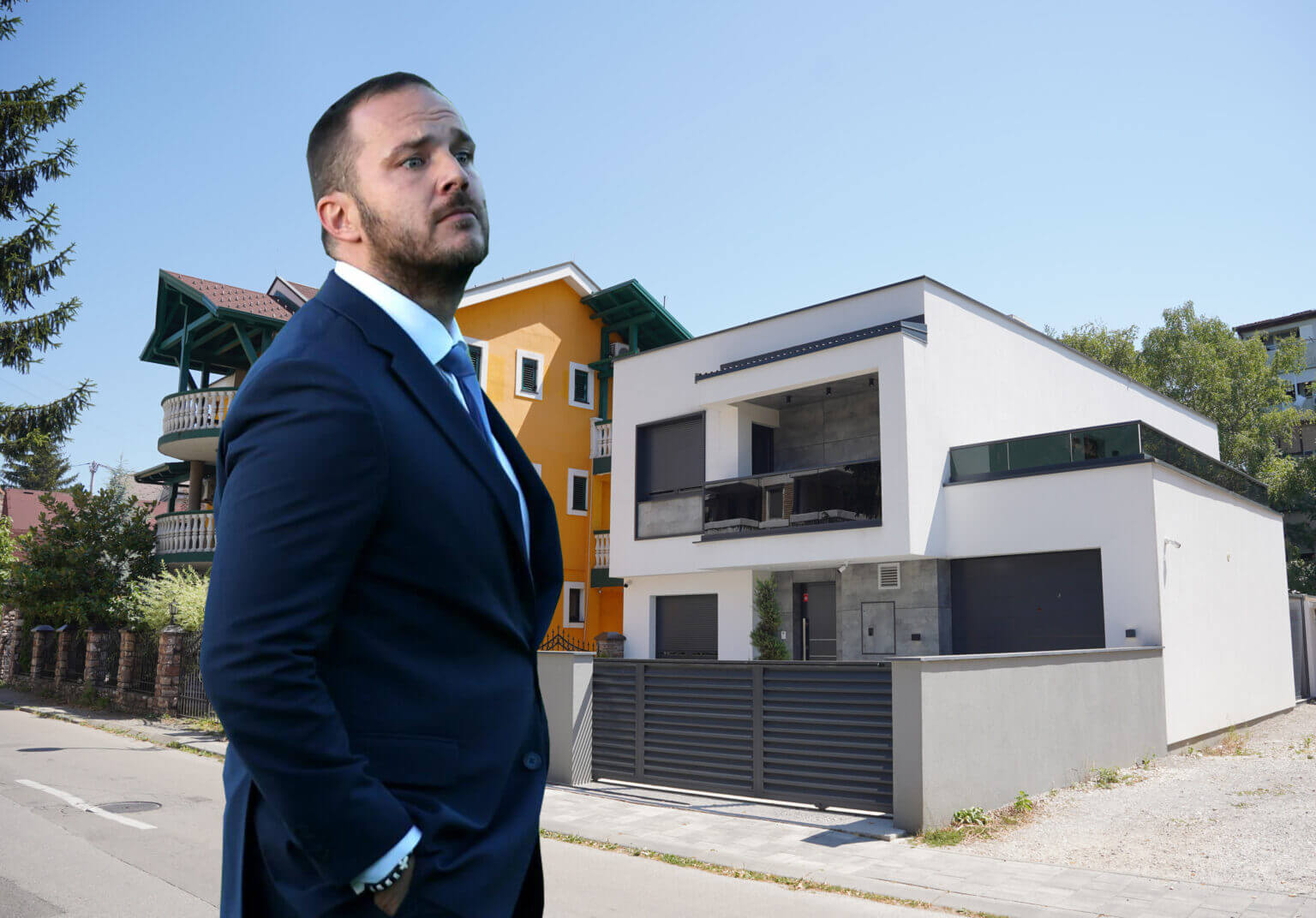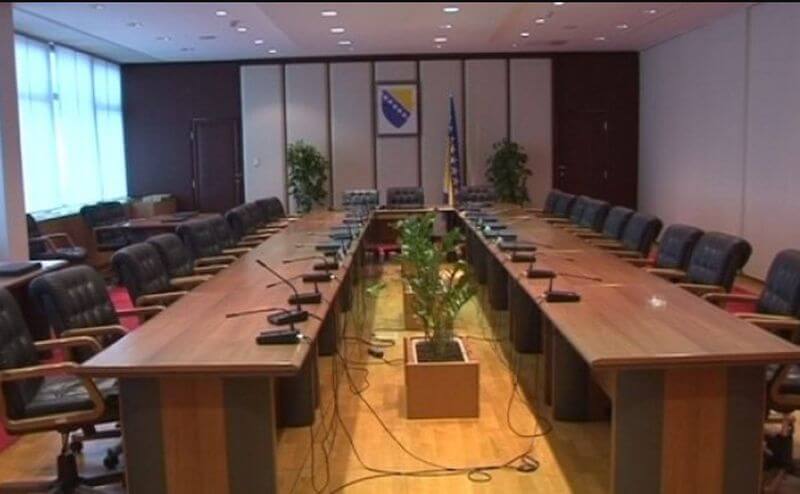The majority of sports clubs in Bosnia and Herzegovina are non-governmental organizations. Magoda: We are not an inspectorate that checks tax debts. Nekić: The question is, what is the purpose of allowing a professional sports club registered as a citizens’ association to receive funding both from investors and the budget?
The Sarajevo Canton, specifically the Ministry of Sports and Culture in the Canton’s Government, allocated 3.5 million KM this year solely for the football clubs Željezničar and Sarajevo, despite both being citizens’ associations.
In addition, FK Sarajevo has private investors who own a majority stake in decision-making. Therefore, both clubs will receive 1 million KM each, and Željezničar will also receive an additional 1.5 million KM for the construction of the south stand.
„Historical budget“
This allocation of public funds is controversial for auditors and activists advocating for greater transparency in public spending.
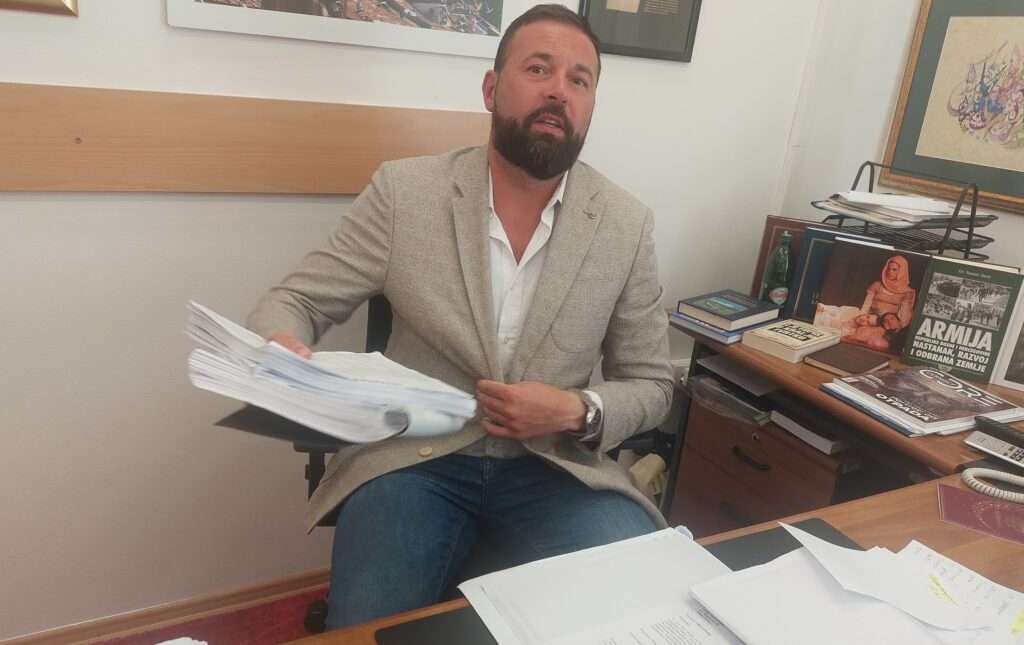
– This year, as I announced before, we have a historic budget for sports, 7.5 million KM. We allocated one million KM each to the football clubs Željezničar and Sarajevo. Both clubs participated in European competitions, and that’s why they received the same amount of money. When we analyzed the support to clubs over the past five years, we noticed that it was insignificant for the Canton. Željezničar, with its 102 years of tradition, deserves better treatment from the Canton. As for FK Sarajevo – it is a fact that there is a certain group of people with decision-making power there. However, they are a citizens’ association like any other. According to our laws, it is impossible to privatize sports clubs. The funds for the construction of the south stand at the Grbavica stadium were allocated because the idea is for the Bosnian national football team to play matches there. This is important from an economic development perspective in the Canton. Look at how it serves as an economic generator in the Zenica-Doboj Canton. The primary goal is to create conditions for the Bosnian national A football team to play in Sarajevo – explains Kenan Magoda, the Minister for Sports and Culture in the Government of Sarajevo Canton.
And what do the auditors say?
It is emphasized that this is the first time in the history of the Sarajevo Canton’s budget that four pillars of sports in the Canton have been included in the Budget Execution Law: Football clubs Željezničar and Sarajevo, Handball club Bosna, and Basketball club Bosna.
The Chief Auditor of the Audit Office of the Institutions in FBiH, Dževad Nekić, says that investment in sports clubs’ infrastructure projects would be justified if the infrastructure facilities were owned by all citizens.
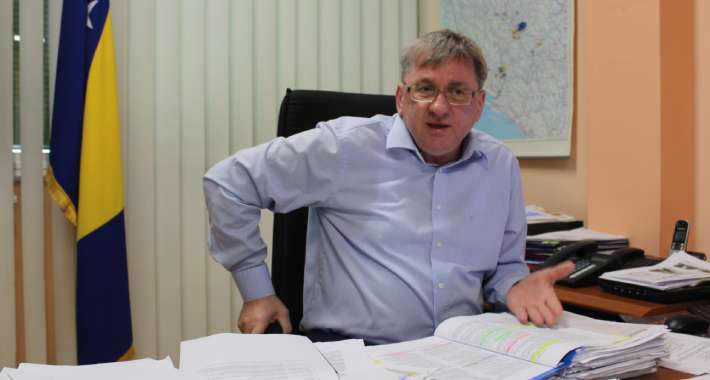
– In such cases, the city, canton, or municipality should take over management, and it should be the property of all citizens. Instead of someone buying the club and becoming the owner of the property, it should belong to all citizens. This is a professional sport with professional athletes who receive significant salaries from the club, but the club does not fulfil its obligations, and later citizens of the Canton take over the burden through the budget. All associations should operate in the same way, but we have associations in quotation marks – says Nekić.
What does the law say?
In the Budget Execution Law of Sarajevo Canton, it is stated: The funds determined in Section 22 of the Budget, under the positions: “Current transfers to individuals in the field of sports,” “Current transfers to individuals in the field of culture,” “Current transfers to non-profit organizations in the field of sports and inclusion,” “Current transfers to non-profit organizations in the field of culture and inclusion,” “Capital transfers to other levels of government in the field of sports,” “Capital transfers to non-profit organizations in the field of sports,” “Capital transfers to non-profit organizations in the field of culture,” “Capital transfers to the city and municipalities in the field of sports,” and “Capital transfers to the city and municipalities in the field of culture,” will be used according to programs determined by the Government. (2) Exceptionally, contrary to paragraph (1) of this article, the Ministry of Culture and Sports will conclude agreements with sports clubs for grant funds for FK Sarajevo, FK Željezničar, RK Bosna, and ORK Bosna, using the funds from the position “Current transfers to non-profit organizations in the field of sports.”
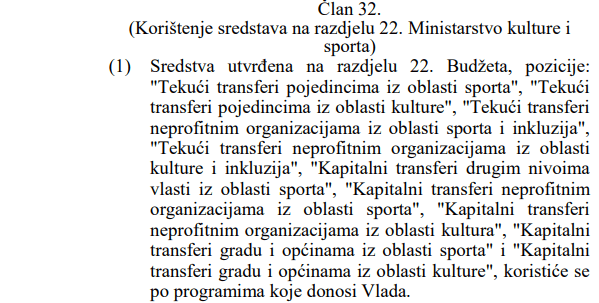
Transparency International in Bosnia and Herzegovina raises the issue of controlling the spending of public funds directed towards sports clubs that are non-governmental organizations.
Who controls spending?
In mid-May 2023, they questioned the donations from public funds to six Premier League clubs because political officials were selected or appointed to their management.
– Most sports clubs in Bosnia and Herzegovina are non-governmental organizations. Unfortunately, that is the case. If money larger than 10,000 or 50,000 KM goes to sports clubs with elected or appointed officials in their management, it constitutes a conflict of interest. And if it goes to clubs without appointed or elected officials in their management, the question of how the money is spent for its intended purpose remains – says Damjan Ožegović from Transparency International in Bosnia and Herzegovina.
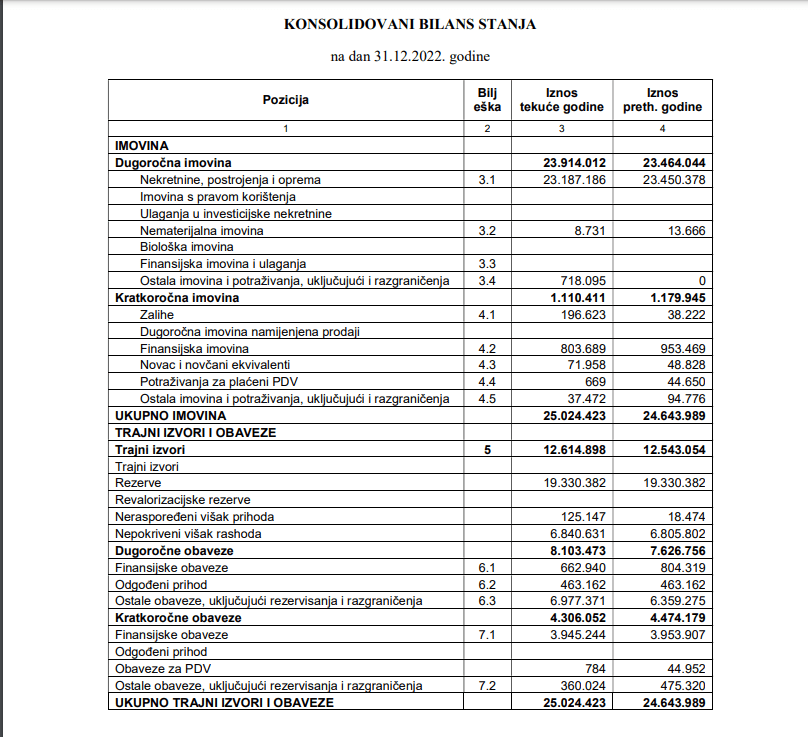
According to available data, FK Željezničar earns around 4 million KM annually, but as of March 31, 2023, it had a tax debt of approximately 2.1 million KM in principal and 1.4 million KM in interest.
However, before June 19, they made a partial payment of the debt and became eligible for the forgiveness of interest accrued until 2018. They boasted that Minister Magoda had helped them in this matter. This was made possible by the law at the level of the Federation of Bosnia and Herzegovina.
They submitted the elaboration
Magoda says that the Ministry of Sport and Culture did not check how the debt of FK Željezničar arose before allocating budget funds.
– The Ministry of Sport and Culture has the authority to control sports activities, but we are not an inspectorate that checks tax debts. That is done by relevant inspections. Our focus is on stabilizing debts and repayment. They have submitted an elaboration of the justification for the investments and the interests of the Sarajevo Canton. They had to elaborate on their activities, financial structure, and strategic plans. It was the first time I requested such a document. Based on that, I will monitor both FK Željezničar and FK Sarajevo, to see if they are acting accordingly, managing the funds they received as agreed, and achieving sports results. If there are no results, the financial support from the Canton will be reduced – says Magoda.
He explains that the grant amount is determined based on results, category classification, and expenses…
When asked if it is justified to provide budget donations to settle a tax debt, which is a budget revenue, Magoda says “no“.
– It is not justified to provide a grant from the budget to settle a tax debt. However, the possibility of settling the debt through a grant was created by the decision of the Government of FBiH. And I was mandated by the Budget Execution Law, which was passed by the Assembly, to do it. It was not my proposal. I was a representative in the Assembly and was appointed as minister seven days before the budget vote – explains Magoda.
When asked how to supervise the spending of this public money, Magoda says that both clubs have presented their activity plans, and the Ministry will monitor the implementation of these documents.
„The money goes towards something else“
On the other hand, the main federal auditor Nekić believes that it is not good for the citizens of the canton to take on the obligations of repaying the debts of civil associations that are essentially commercial sports clubs through the budget.
– All levels of government allocate budget funds for sports development. We examine whether such allocations are justified and whether the money is spent as intended. However, there are often no reports or information on the expenditure. This is probably because the money is not used for development, but for something else. I think it can be used for other purposes, but it should be specified for what, and let the citizens evaluate such decisions in elections. If we talk about sports development, it might be good for it to support sports schools that children who want to participate in sports can attend, rather than using it to pay the obligations towards professional athletes. Budgets often include funds for transferring to sports clubs, but we always insist on transparency and clear criteria to determine who will receive the funds – explains Nekić.
From investors and the budget
He emphasizes that the status of sports clubs in Bosnia and Herzegovina is not clear, particularly how individuals or groups become part of the management of these associations.
– The question is, what is the purpose of a professional sports club, registered as a civil association, receiving funds from investors and the budget? However, if the budget execution law provides for allocating funds to a sports club, and if it was included in the budget draft and discussed publicly, then it is in accordance with the procedure. The question remains whether it is morally and justifiably appropriate – explains Nekić.
As a reminder, FK Sarajevo announced in December 2022 that all obligations and conditions assumed by investors Ismir Mirvić and Vincent Tan, according to the contract signed on 20th September 2021, had been fulfilled, making them officially owners of 98.26% of the voting rights.

The club announced that since the entry of these two investors, a total of 9.7 million KM has been invested in the club.
Continuation of foreign investments
They stated that with the help of these investors, they have covered inherited debts, stabilized the operations, and improved the infrastructure with a special focus on enhancing the conditions at the FK Sarajevo Academy.
– The club representatives have initiated negotiations with the investors regarding the continuation of investments in the second phase. Mr Mirvić and Mr Tan were presented with a strategic development plan for the club for a two-year period, aiming to achieve successful results with the first team and further develop the FK Sarajevo Academy. This includes significant investments in infrastructure and the best system and personnel to support the development process of young players. FK Sarajevo will inform the fans and the public in a timely manner about the outcome of the negotiations and the further steps in this process – as stated in the club’s announcement.
Former Minister of Sport and Culture in the Government of Sarajevo Canton, Samir Avdić, declined to comment on the high grants provided to sports clubs, stating that it is a matter for the new minister.
We will follow the goals
Magoda responds to the question, asserting that this matter requires “courage and vision.”
– This is a managerial position, and I have a successful sports career myself. I was the best manager in the history of Bosnian sports because I led RK Bosna to win the 16th final of the Handball Champions League, which is a historic success in team sports. No other director or manager has achieved that. The decision to provide high grants requires courage. We have not had significant results for years, but I told these clubs that there is no money without results. I told them they must enter Europe, and both clubs did. That is the goal, and we will monitor their objectives. KK Bosna will also receive additional funding if they play in the ABA League this year, and our target for the next year is to compete in ABA 1 League – explains Magoda.
Marijela Margita Hašimbegović, a member of the Sports Commission in the Sarajevo Canton Assembly, expresses concerns about the unclear destination of the funds intended for sports development.
– We voted for the budget in which the total amount is specified, but there is genuine concern about the transparent and purposeful spending of that money – says Margita Hašimbegović.
BiH doesn’t have a law on sport
Sports journalists we spoke to for this article declined to comment on the situation with grants in the Sarajevo Canton.
They emphasize that there is no way to supervise the work of sports clubs because they are non-governmental organizations. Additionally, Bosnia and Herzegovina does not have a sports law, which further complicates the matter.
However, they warn that sports clubs in the region receive significantly larger funds from the budget than FK Željezničar and Sarajevo. They believe that public funds should have been allocated to both Željezničar and Sarajevo, or else demonstrations could have erupted in Sarajevo. They also point out that FK Čelik, which owns the Bilino Polje stadium, covers the expenses of the Bosnia and Herzegovina national football team’s games, which should be the responsibility of the City of Zenica.
Magoda explains that while the Bosnian national football team can play at the Zenica stadium, Sarajevo also needs a serious stadium.
– We have stagnated in the construction of infrastructure, and I want to change the paradigm in both sports and culture. A national stadium is an economic generator. Citizens of the Sarajevo Canton probably wonder why we can’t bring an A-list singer here, but we can’t because our stadiums fall far below the required standards. Zetra or Koševo Stadium does not meet the conditions; it would require much larger investments. On the other hand, Željezničar already has a project for Grbavica, and with the construction of the southern stand, it will have a capacity of 20,000 seats – clarifies Magoda.
„The Novi Grad Municipality is undertaking this construction“
And when asked why the canton doesn’t focus on building the national stadium that the Novi Grad Municipality is announcing, they say, “The Novi Grad Municipality is undertaking this construction.”
– We don’t need two national stadiums. The Grbavica Stadium is not currently a national stadium, but it has the potential to become one. However, it is a stadium that is 100% owned by FK Željezničar, and there is a possibility that national teams could play there. We don’t have a national stadium at the level of Bosnia and Herzegovina where all national teams from different sports across the entire country could play. This current project is just the beginning of building the southern stand, expanding the capacity. It’s not a large-scale project; there are dozens of others that are not as visible. We allocated 2 million for a sports hall in Hrasnica and 2 million KM for a swimming pool in Dobrinja. We don’t have a national interest when it comes to sports and culture; we don’t monitor the development of national selections. The Ministry of Civil Affairs is not doing its job, so the Government of Sarajevo Canton funds national institutions that are of importance for Bosnia and Herzegovina. – explains Magoda.
Approach to Support Will Change
In Sarajevo Canton, there are approximately 580 sports clubs, with only 63 of them being football clubs. That’s the number of clubs that applied for the public call from the Ministry for grants in the sports sector.
Interestingly, according to the Ministry’s data, the biggest tax debtor among the sports clubs in Sarajevo Canton is KK Bosna, with a debt of 770,000 KM.
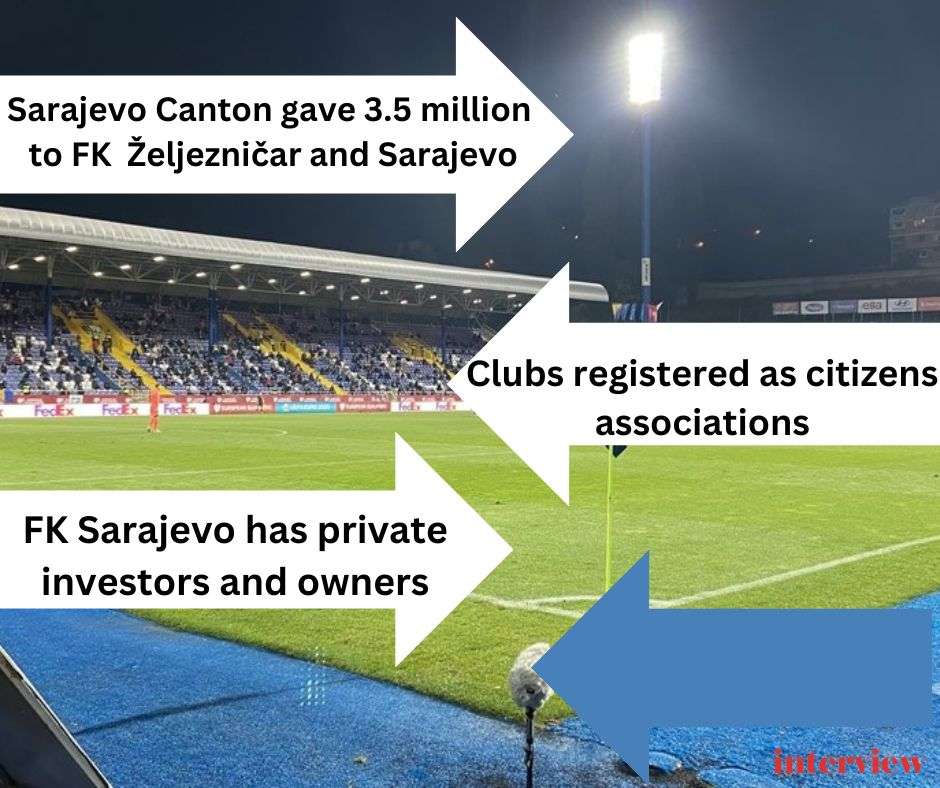
The Ministry has cancelled the public call for registration of sports clubs with tax debts incurred until the end of 2020. Only three clubs applied, out of which two did not meet the formal and legal requirements.
(Interview)




